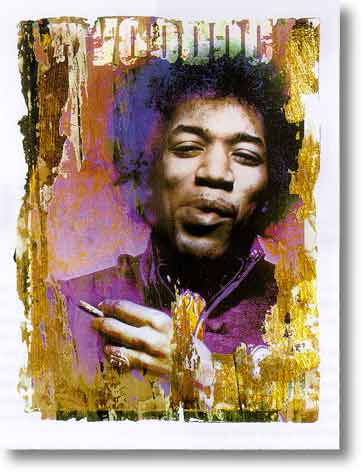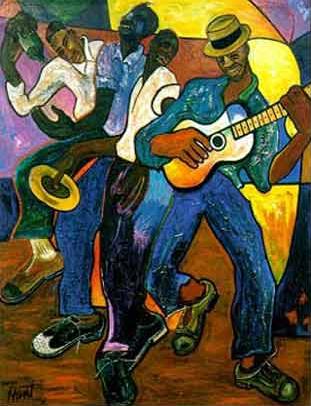|
Call
myself a literary bluesman. Lotta folk dont understand the blues. Think the blues about feeling bad. The blues about getting through the blues. Getting through life. Through trial and tribulation and the transformation of adversity into strength Finessing the hardtimes, celebrating the goodones. Maintaining, nurturing the culture. Living a life of harmonic grace. |
 |
|
August Wilson recounts what he considers his moment of artistic revelation, when in the Fall of 1965 he put on an old 78 rpm, Nobody in Town Can Bake a Sweet Jellyroll like Mine by Bessie Smith and says it was a "resurrection and a redemption", says the "universe stuttered and everything fell into a new place," says it was "the beginning of my consciousness that I was representative of a culture and the carrier of some very valuable antecedents . . . I saw the blues as a cultural response of a nonliterate people whose history and culture were rooted in the oral tradition. The response was to a world that was not of their making, in which the idea of themselves as a people of imminent worth that belied their recent history was constantly assaulted. It was a world that did not recognize their gods, their manners, their mores. It despised their ethos and refused to even recognize (their) humanity. In such an environment the blues was a flag bearer of definition . . . . a spiritual conduit that gave spontaneous expression to the spirit that was locked in combat and devising new strategies for engaging life and enlarging itself. It was a true and articulate literature that was in the forefront of the development of both character and consciousness. I turned my ear, my heart and whatever analytical tools I possessed to embrace this world. I elevated it, rightly or wrongly, to biblical status." |
||
|
There are some in Afroam lit who feel heirs to two literary traditions, the Western written tradition and the African oral and hope in the fusion to contribute to the evolution of both. From August Wilson to Morrison to Wideman some of the most innovative voice in African American lit have experimented with an African American literary language.. "I
was after all a bluesman," says August
Wilson, "Never mind I couldn't play a guitar or carry a tune in a
bucket. I was cut out of the same cloth." |
Consciously attempting to forge a uniquely African American narrative language based on the oral tradition and its musical notes such as blues, jazz and hiphop. Litericizing AfricanAmerican folk language and enhancing its functionality as an instrument of emotional/cultural/literary expression and 21st Century thought and development. |
|
As
much music and orally based as it is on conventional literary forms and
bearing the tension of Chestnuts half formal halfdialect narratives, the
tension between Rich Wrights conventional narration and Zora Neales dialectwork.
Personally I would find it difficult not to play with the laanguage. But
you can tell who is influenced by blues and who speaks to jazz and now
hip hop. Trying to play with the language.
Its more than phonetic spelling. We talking phraseology here. And something even more subtle. Searching for that little extra beat that defines black literature and black art as fundamentally as it defines black music. Stuff like audience participation, improvisation, orality and functionality. Stuff like Magic. The sacred quality of art. The explorations of afroam culture manifested in the narrative structure of Naylor or Wideman.What Toni refers to in Rootedness after explaining how she uses the earth as an afrocentric chorus responding to the action in Tar Baby "Those are ways in which I try to incorporate, into that traditional genre the novel, unorthodox novelistic characteristics-so that it is, in my view, Black, because it uses the characteristics of Black art. . . . I don't regard Black literature as simply books written by Black people, or simply as literature written about Black people, or simply as literature that uses a certain mode of language in which you just sort of drop g's. There is something very special and very identifiable about it and it is my struggle to find that elusive but identifiable style in my books." |
| African
American literary blues practitioners are cultural custodians attempting
to develop a heightened narrative language that serves as both literary
and sacred language; as both text (personal and cultural expression) and
Text (cultural template). Consciously griotic, AfricanAmerican literature is passionately concerned with cultural custodianship. As the voice of a culture that has since its inception felt itself under mortal siege, African American literature is fundamentally shamanistic and vitally concerned with communal health and employment |
An
attempt to ensure the 21st Century viability of African American culture.
Forging a narrative instrument worthy of 21st Century nuance, an instrument
of literary, political and spiritual redemption. |


